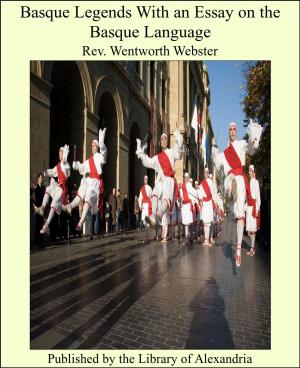The Hour Will Come: A Tale of an Alpine Cloister (Complete)
Nonfiction, Religion & Spirituality, New Age, History, Fiction & Literature| Author: | Wilhelmine von Hillern | ISBN: | 9781465534293 |
| Publisher: | Library of Alexandria | Publication: | March 8, 2015 |
| Imprint: | Language: | English |
| Author: | Wilhelmine von Hillern |
| ISBN: | 9781465534293 |
| Publisher: | Library of Alexandria |
| Publication: | March 8, 2015 |
| Imprint: | |
| Language: | English |
ST. VALENTINE'S ON THE HEATH. The heath or moorland plateau of Mals lies wide--spread, silent, and deserted where the lofty head of the Grossortler towers up, and overlooks it in eternal calm. It is five centuries ago--a mere moment in that world of everlasting snows; the keen autumn wind, as at this day, is rushing through the grey halms of the charlock, woodrush and heathgrasses, that have caught a doubtful, golden gleam reflected from the glaciers which are bathed in the glow of the sinking sun; as at this day, the gale packs the driving white clouds together in the still highland valley, as though to rest for the night. They heave and roll noiselessly, spreading a white, misty sheet over the withered heathgrass. The mirror-surface of the moorland tarn lies lead-coloured and dull, wrinkled by the night-breeze, and its icy waters trickle in tiny rills over the bare plain and down to the valley. All is the same as it is to this day! Only life is wanting, life warm and busy, which in these days is stirring in the villages and homesteads that dot the plain, and that have brought the dead moorland into tilth and fertility. Profound silence reigns over the immeasurable level, throughout its length and breadth no living thing stirs; it is as if this were indeed the neutral space between Heaven and Hell--a vast, eternal void! Only the monotonous murmur of the Etsch--that cold artery of the desolate heath--and the roar of the winds that sweep at night across the plateau; these are the eerie voices of this realm of death. Woe to the lonely pilgrim who is wandering through the night in this boundless desert, in storm and snow, in impenetrable darkness; he is lost in nothingness, owned by neither Heaven nor Hell, and the earth knows him not! No ear can hear his cry for help, it is lost in vacancy; the raven and the wolf mark him down, but they tell no one of their mute prey. It is true that pitying love has penetrated even to this wilderness and realm of death, and spreads her arms so far as they may reach; but they are but human arms, weak and inadequate for the great divine mind that animates them. Every evening, above the howling of the storm and the roaring of the highland lake, as dusk creeps on, the Vesper bell rings softly out like the beat of some metallic heart. Then a dull-red, flaring blaze is suddenly seen, which parts into wandering storm-blown flakes of flame that disperse themselves about the moor till they vanish in the mist and darkness. The shepherd and lay-brethren it is, who go forth with torches and biers from the Hospice of Saint Valentine in the moor, which pious faith has erected for the lost traveller here in the wilderness. Defying the warring elements, they seek in silent and fearless devotion the strayed, the perishing, and the hungry, and bring them in to the warm hearth of humanity. Happy is he whom they find, he is rescued--but the moor is wide, and they are but a forlorn little handful of men, not all-knowing nor all-seeing
ST. VALENTINE'S ON THE HEATH. The heath or moorland plateau of Mals lies wide--spread, silent, and deserted where the lofty head of the Grossortler towers up, and overlooks it in eternal calm. It is five centuries ago--a mere moment in that world of everlasting snows; the keen autumn wind, as at this day, is rushing through the grey halms of the charlock, woodrush and heathgrasses, that have caught a doubtful, golden gleam reflected from the glaciers which are bathed in the glow of the sinking sun; as at this day, the gale packs the driving white clouds together in the still highland valley, as though to rest for the night. They heave and roll noiselessly, spreading a white, misty sheet over the withered heathgrass. The mirror-surface of the moorland tarn lies lead-coloured and dull, wrinkled by the night-breeze, and its icy waters trickle in tiny rills over the bare plain and down to the valley. All is the same as it is to this day! Only life is wanting, life warm and busy, which in these days is stirring in the villages and homesteads that dot the plain, and that have brought the dead moorland into tilth and fertility. Profound silence reigns over the immeasurable level, throughout its length and breadth no living thing stirs; it is as if this were indeed the neutral space between Heaven and Hell--a vast, eternal void! Only the monotonous murmur of the Etsch--that cold artery of the desolate heath--and the roar of the winds that sweep at night across the plateau; these are the eerie voices of this realm of death. Woe to the lonely pilgrim who is wandering through the night in this boundless desert, in storm and snow, in impenetrable darkness; he is lost in nothingness, owned by neither Heaven nor Hell, and the earth knows him not! No ear can hear his cry for help, it is lost in vacancy; the raven and the wolf mark him down, but they tell no one of their mute prey. It is true that pitying love has penetrated even to this wilderness and realm of death, and spreads her arms so far as they may reach; but they are but human arms, weak and inadequate for the great divine mind that animates them. Every evening, above the howling of the storm and the roaring of the highland lake, as dusk creeps on, the Vesper bell rings softly out like the beat of some metallic heart. Then a dull-red, flaring blaze is suddenly seen, which parts into wandering storm-blown flakes of flame that disperse themselves about the moor till they vanish in the mist and darkness. The shepherd and lay-brethren it is, who go forth with torches and biers from the Hospice of Saint Valentine in the moor, which pious faith has erected for the lost traveller here in the wilderness. Defying the warring elements, they seek in silent and fearless devotion the strayed, the perishing, and the hungry, and bring them in to the warm hearth of humanity. Happy is he whom they find, he is rescued--but the moor is wide, and they are but a forlorn little handful of men, not all-knowing nor all-seeing















